What is Psyllium Husk Powder? Complete Guide for Beginners (2025)
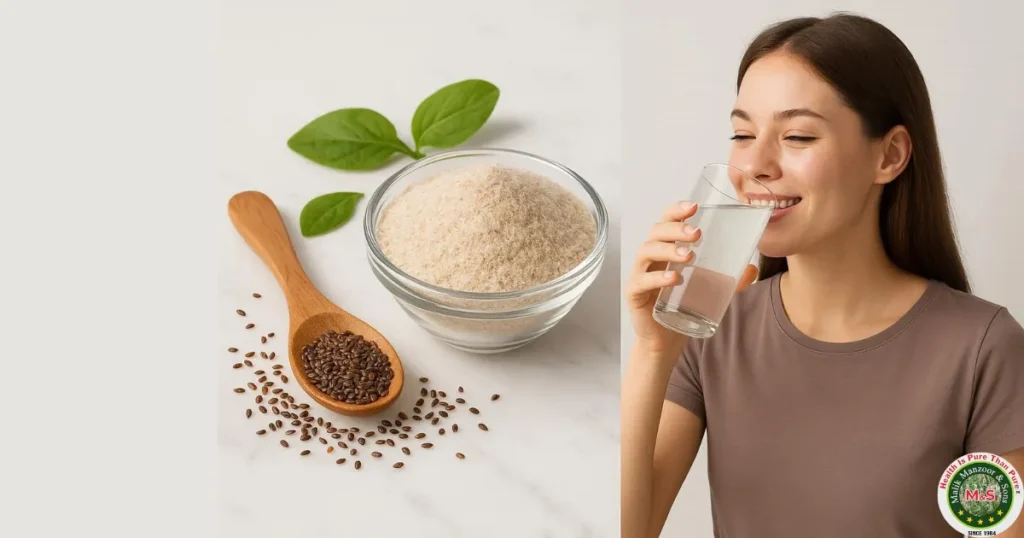
Have you ever walked through a health store and wondered about that beige powder promising miraculous digestive benefits? Or perhaps you’ve heard your grandmother mention “isabgol” as a cure-all remedy, but never quite understood what it really is? You’re not alone. Thousands of people search “what is psyllium husk powder” every month, seeking clarity about this natural fiber supplement that’s been transforming health routines worldwide.
Whether you’re exploring natural remedies for the first time or looking to understand why health experts consistently recommend this ancient superfood, this comprehensive guide will walk you through everything you need to know. From its botanical origins to practical daily uses, you’ll discover why psyllium husk powder has earned its reputation as nature’s gentle healer.
What is Psyllium Husk Powder? Understanding the Basics
The Simple Definition
Psyllium husk powder is a natural, plant-based dietary fiber supplement derived from the outer coating (husk) of seeds from the Plantago ovata plant. This medicinal herb grows predominantly in regions of India and Pakistan, where it’s been cultivated for centuries and known traditionally as “isabgol” (اسبغول).
The powder form is created by finely grinding these seed husks into a smooth, beige-colored powder that dissolves easily in liquids and can be incorporated into various foods and beverages.
The Botanical Background
The Plantago ovata plant belongs to the Plantaginaceae family and thrives in semi-arid climatic conditions. After decades of cultivating this remarkable plant across Pakistan’s fertile plains, I’ve witnessed firsthand how soil quality, climate, and harvesting techniques directly impact the fiber content and effectiveness of the final product.
At Malik Psyllium, we’ve perfected the cultivation and processing methods that preserve the husk’s natural mucilage content– the component responsible for its exceptional health benefits. Our farms in Pakistan’s psyllium belt produce some of the world’s highest-quality husks, meeting international pharmaceutical and food-grade standards.
From Plant to Powder: The Processing Journey
Understanding what is psyllium husk powder requires knowing how it’s made:
- Cultivation: Plantago ovata seeds are sown in October-November
- Growth Period: Plants mature over 130-140 days
- Harvesting: Seeds are harvested in March-April when fully ripe
- Separation: Mechanical processes separate husks from seeds
- Cleaning: Multiple cleaning stages remove impurities
- Grinding: Husks are finely milled into powder form
- Quality Testing: Laboratory analysis ensures purity and potency
- Packaging: Sealed in moisture-proof containers to maintain freshness
Scientific Classification
Scientific Name: Plantago ovata
Common Names: Psyllium, Isabgol, Ispaghula, Blond Plantago
Active Component: Mucilage (65-85% of husk content).
Primary Use: Dietary fiber supplement.
Forms Available: Whole husk, powder, capsules, and wafers.
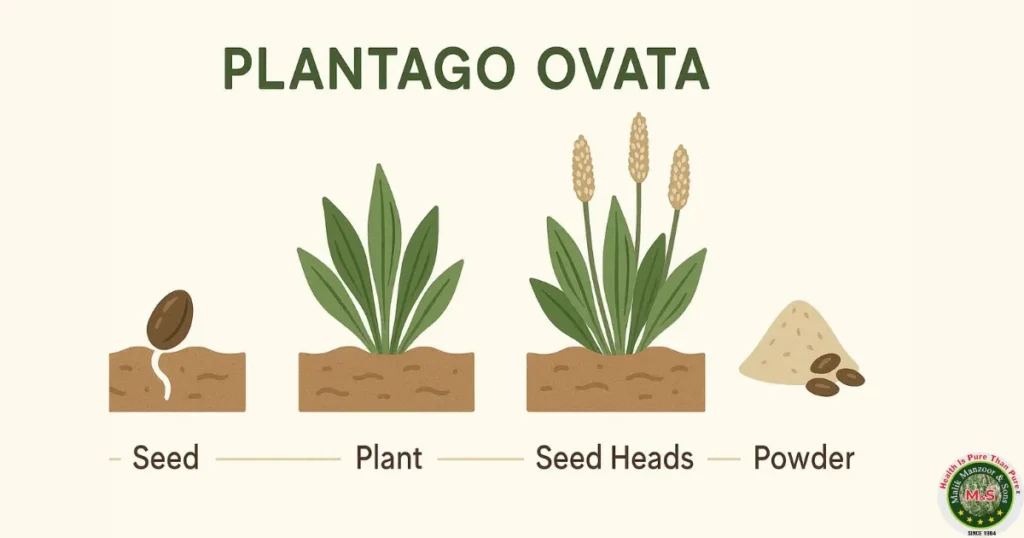
Understanding Psyllium Hydrophilic Mucilloid Powder.
What makes it “Hydrophilic”?
The term “psyllium hydrophilic mucilloid powder” sounds complex, but it simply describes psyllium’s water-loving (hydrophilic) nature. When psyllium powder contacts water, its mucilage content absorbs liquid and expands up to 10-14 times its original volume, forming a gel-like substance.
This unique hydrophilic property is what makes psyllium so effective for:
- Digestive regulation.
- Cholesterol management.
- Blood sugar stabilization.
- Weight management support.
The Mucilage Mechanism.
Mucilage is a complex polysaccharide that creates a viscous gel when hydrated. This gel:
- Slows digestion: Extends nutrient absorption time.
- Adds bulk: Promotes healthy bowel movements.
- Binds substances: Captures cholesterol and toxins.
- Feeds bacteria: Supports beneficial gut microbiome.
Medical-Grade vs Food-Grade.
Pharmaceutical Grade (Psyllium Hydrophilic Mucilloid):
- 95%+ purity levels.
- Used in prescription medications.
- Strict quality certifications.
- Higher price point.
Food Grade (Regular Psyllium Husk Powder):
- 85-95% purity levels.
- Suitable for dietary supplements.
- Food safety certified.
- More economical.
Both types offer similar benefits; the difference lies primarily in purity standards and regulatory compliance requirements.
Organic Psyllium Husk Powder: What sets it Apart?
Defining Organic Standards.
Organic psyllium husk powder comes from plants grown without:
- Synthetic pesticides.
- Chemical fertilizers.
- Genetically modified organisms (GMOs).
- Artificial growth hormones.
- Radiation treatment.
Certification Requirements.
Legitimate organic psyllium must carry certifications from recognized bodies:
- USDA Organic (United States).
- EU Organic (European Union).
- NPOP (National Programme for Organic Production – India).
- Organic Pakistan (Pakistan Council of Scientific and Industrial Research).
Comparison: Organic vs Conventional.
| Aspect | Organic Psyllium | Conventional Psyllium |
| Pesticide Residue | None detected | Trace amounts possible |
| Environmental Impact | Lower carbon footprint | Higher chemical usage |
| Soil Health | Regenerative practices | Depleting methods possible |
| Price Difference | 20-30% higher | More affordable |
| Nutritional Value | Similar fiber content | Similar fiber content |
| Taste/Texture | Identical | Identical |
| Effectiveness | Same | Same |
| Shelf Life | 18-24 months | 18-24 months |

Is Organic Worth the Premium?
Choose organic psyllium husk powder if you:
- Prioritize chemical-free products
- Want to support sustainable farming
- Have chemical sensitivities
- Prefer preventive health approaches
- Can accommodate the higher cost.
Conventional may suffice if you:
- Work within a tight budget
- Trust established brand quality controls
- Focus primarily on fiber content
- Have no chemical sensitivities.
From our farming experience, both organic and conventional psyllium, when sourced from reputable producers, offer comparable health benefits. The choice often comes down to personal values and budget considerations.
Psyllium Husk Powder in Pakistan: The Global Leader.
Why Pakistan Dominates the Market.
Pakistan produces approximately 60-65% of the world’s psyllium supply, making it the undisputed global leader. The provinces of Punjab and Sindh provide ideal growing conditions:
Climate Advantages:
- Semi-arid climate with minimal rainfall.
- Temperature ranges are perfect for seed development.
- Long, dry harvest seasons preventing mold.
- Consistent weather patterns year-round.
Agricultural Heritage:
- Multi-generational farming expertise.
- Traditional cultivation knowledge.
- Modern agricultural techniques integration.
- Government support for psyllium farming.
Major Production Regions.
Top Psyllium Growing Areas in Pakistan:
Rahim Yar Khan (Punjab).
- Largest production area.
- Premium quality husks.
- Established processing facilities.
Bahawalnagar (Punjab).
- High-yield varieties.
- Modern farming practices.
- Export-focused production.
Mirpur Mathelo (Sindh).
- Traditional cultivation methods.
- Organic farming initiatives.
- Quality-focused producers.
Sanghar (Sindh).
- Growing production volumes.
- Investment in technology.
- Emerging export hub.

Psyllium Husk Powder in Pakistan Market Insights.
Production Statistics (2024-2025):
- Annual Production: 80,000-100,000 metric tons.
- Export Volume: 75-80% of total production.
- Local Consumption: 15,000-20,000 metric tons.
- Growth Rate: 8-10% annually.
Export Destinations:
- United States (35%).
- European Union (25%).
- Middle East (15%).
- Asia-Pacific (15%).
- Rest of World (10%).
Quality Standards in Pakistan.
Pakistani psyllium exporters adhere to international standards:
- FDA Compliance (US Food and Drug Administration).
- European Pharmacopoeia Standards.
- ISO Certifications (Quality Management).
- HACCP (Hazard Analysis Critical Control Points).
- GMP (Good Manufacturing Practices).
Buying Pakistani Psyllium: What to Look For.
Quality Indicators:
- Light beige to cream color
- Fine, consistent powder texture
- Clean, neutral aroma
- Swelling index: 8-12 times volume
- Lab test certificates included
- Proper packaging with seal integrity
- Clear expiration dates
- Transparent sourcing information.
Red Flags:
- Dark or greyish color
- Musty or off odors
- Visible impurities or debris
- Clumping or moisture exposure
- Missing certifications
- Suspiciously low prices
- Unclear origin information.
Psyllium Husk Powder in Urdu: Cultural Context & Traditional Uses.
Psyllium Husk Powder in Urdu: اسبغول پاؤڈر.
In Urdu-speaking regions, psyllium is universally known as “Isabgol” (اسبغول), derived from Persian words “asp” (horse) and “ghol” (ear), referring to the seed’s shape resembling a horse’s ear.
Traditional Names across Regions.
- Urdu/Hindi: اسبغول (Isabgol)/ ईसबगोल (Ispaghol).
- Arabic: لسان الحمل (Lisan ul hamal).
- Persian: اسپرزه (Asparzeh).
- Bengali: ঈশবগুল (Ishabgul).
- Punjabi: ਈਸਬਗੋਲ (Isabagola).
Time-Honored Remedies in Desi Medicine.
Traditional Unani and Ayurvedic medicine systems have utilized isabgol for centuries:
Qabz ka Ilaj (Constipation Treatment):
- Mix 1-2 teaspoons with cold milk.
- Take before bedtime.
- Continue for 3-5 days.
Dast ka Ilaj (Diarrhea Treatment):
- Combine with yogurt (dahi).
- Take 2-3 times daily.
- Helps absorb excess water.
Garmi ka Tareeqa (Cooling Remedy):
- Mix with rose water and sugar.
- Consume during summer months.
- Reduces body heat (garam mizaj).
Pet ki Safai (Digestive Cleansing):
- Take with warm water first thing morning.
- Add lemon juice, optional.
- Monthly detox practice.
Modern Desi Usage Patterns.
Today’s Pakistani and Indian households use psyllium husk powder for:
Morning Rituals:
- Added to lassi (yogurt drink).
- Mixed with milk and cardamom.
- Stirred into fresh fruit juice.
- Combined with protein shakes.
Cooking Applications:
- Chapati dough enhancer (adds fiber).
- Halwa preparation thickener.
- Smoothie bowl ingredient.
- Traditional ladoo binder.
Seasonal Consumption:
- Summer: With cold beverages for cooling.
- Winter: With warm milk for comfort.
- Ramadan: Pre-dawn sahri for satiety.
- Post-illness: For gentle digestive recovery.
Cultural Wisdom Passed Down.
Pakistani grandmothers (Daadi/Naani) often share these pearls of wisdom:
- “Subah subah isabgol, pet rahe khush har pal”.
(Morning isabgol keeps your stomach happy always).
- “Thanda paani, isabgol saath, sehat rahe saath”.
(Cold water with isabgol, health stays with you).
These traditional sayings reflect generations of empirical understanding about psyllium’s gentle yet effective nature.

How Psyllium Husk Powder Works in Your Body.
The Digestive Journey.
Step 1: Ingestion & Hydration (0-5 minutes).
- Powder mixes with liquid.
- Mucilage begins absorbing water.
- Gel formation starts immediately.
Step 2: Stomach Passage (5-30 minutes).
- Gel expands creating fullness sensation.
- Slows gastric emptying.
- Doesn’t break down in stomach acid.
Step 3: Small Intestine (30 minutes – 3 hours).
- Slows nutrient absorption rate.
- Regulates blood sugar spikes.
- Binds to cholesterol molecules.
- Feeds beneficial bacteria.
Step 4: Large Intestine (3-12 hours).
- Adds bulk to stool.
- Retains water for softness.
- Stimulates natural peristalsis.
- Supports regular elimination.
Step 5: Elimination (12-48 hours).
- Carries waste products out.
- Removes bound cholesterol.
- Eliminates captured toxins.
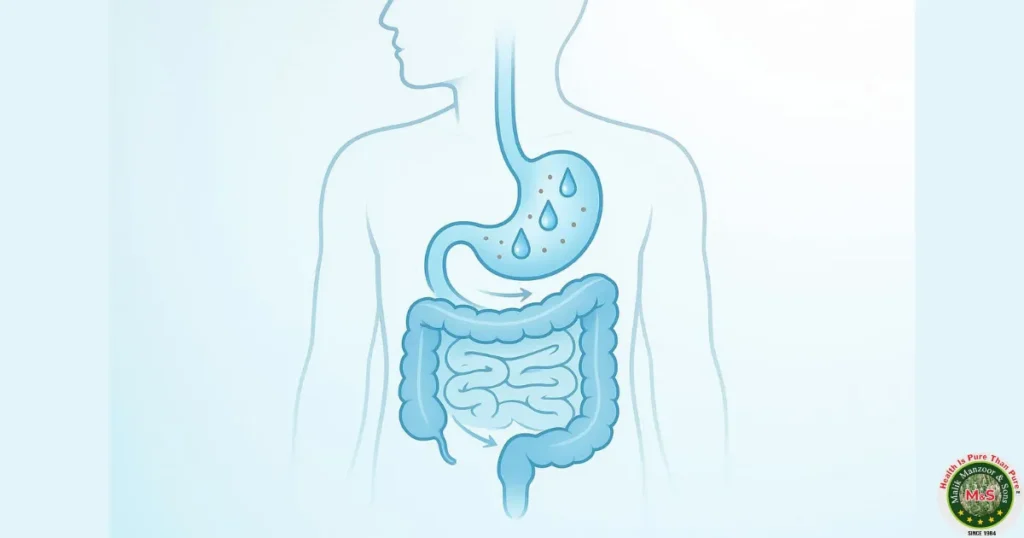
The Fiber Science.
Soluble vs Insoluble Fiber:
Psyllium contains approximately 70% soluble fiber and 30% insoluble fiber – an ideal ratio for digestive health.
Soluble Fiber Actions:
- Forms gel in water.
- Slows digestion.
- Feeds gut bacteria (prebiotic).
- Lowers cholesterol.
- Stabilizes blood sugar.
Insoluble Fiber Actions:
- Adds stool bulk.
- Speeds intestinal transit.
- Prevents constipation.
- Supports colon health.
Impact on Gut Microbiome.
Recent research reveals psyllium’s prebiotic properties:
- Increases Bifidobacteria populations.
- Boosts Lactobacillus species.
- Produces short-chain fatty acids (SCFAs).
- Strengthens intestinal barrier.
- Reduces inflammation markers.
Comprehensive Health Benefits.
1. Digestive Health & Regularity.
Primary Benefits:
- Relieves constipation within 12-72 hours.
- Manages diarrhea by absorbing excess water.
- Alleviates IBS (Irritable Bowel Syndrome) symptoms.
- Supports hemorrhoid healing.
- Reduces anal fissure discomfort.
Clinical Evidence: Studies show 85-90% of users experience improved bowel regularity within one week of consistent use.
2. Heart Health & Cholesterol Management.
Cardiovascular Benefits:
- Reduces LDL cholesterol by 5-10%.
- May decrease blood pressure slightly.
- Lowers triglyceride levels.
- Reduces heart disease risk factors.
FDA Recognition: The FDA allows health claims about psyllium’s cholesterol-lowering effect – a rare acknowledgment for supplements.
3. Blood Sugar Control.
Diabetes Management:
- Slows glucose absorption.
- Reduces post-meal blood sugar spikes.
- Improves insulin sensitivity.
- Helps maintain stable energy levels.
Research Findings: Daily psyllium consumption can reduce fasting blood glucose by 10-12% in type 2 diabetics.
4. Weight Management Support.
Weight Loss Mechanisms:
- Increases satiety and fullness.
- Reduces appetite naturally.
- Decreases overall calorie intake.
- Slows fat absorption.
Realistic Expectations: Combined with a healthy diet and exercise, users typically lose 0.5-1 kg per week over 12-16 weeks.
5. Colon Health Protection.
Long-term Benefits:
- May reduce colon cancer risk.
- Promotes healthy cell turnover.
- Removes carcinogenic compounds.
- Maintains optimal pH levels.
6. Detoxification Support.
Natural Cleansing:
- Binds to heavy metals.
- Captures environmental toxins.
- Supports liver function.
- Promotes overall elimination.
Practical Usage Guide: How to Take Psyllium.
Beginner’s Dosage Protocol.
Week 1:
- Start: 1/2 teaspoon once daily.
- Timing: Morning before breakfast.
- Water: 10-12 oz (300ml) minimum.
Week 2:
- Increase: 1 teaspoon once daily.
- Continue morning timing.
- Water: Same amount.
Week 3+:
- Standard: 1 teaspoon 2x daily.
- Timing: Morning and evening.
- Water: 10-12 oz per dose.
Maximum Dosage:
- Adults: 30g (approximately 6 teaspoons) daily.
- Split into 2-3 doses.
- Always with adequate water.
Step-by-Step Mixing Instructions.
The Perfect Psyllium Drink:
1. Prepare Your Liquid (8-12 oz).
- Cold water (easiest).
- Fruit juice (tastier).
- Plant milk (creamier).
- Avoid hot liquids (creates instant gel).
2. Measure Powder.
- Use measuring spoon.
- Level off for accuracy.
- Start conservative.
3. Mix Technique.
- Add powder to liquid (not reverse).
- Stir vigorously for 15-20 seconds.
- Use shaker bottle for best results.
4. Drink Immediately.
- Consume within 30 seconds.
- Before mixture thickens.
- Don’t let it sit.
5. Follow-Up Hydration.
- Drink another 8-10 oz water.
- Within 10 minutes.
- Critical for effectiveness.
Best Times to Take Psyllium.
For Constipation Relief:
- Evening before bed.
- Works overnight.
- Morning elimination.
For Weight Management:
- 20-30 minutes before meals.
- Reduces appetite naturally.
- Controls portions.
For Blood Sugar Control:
- With meals containing carbs.
- Slows glucose absorption.
- Prevents spikes.
For General Health:
- First thing morning.
- Consistent daily timing.
- Becomes a routine habit.
Common Mistakes to Avoid.
- Not drinking enough water – Leading cause of discomfort
- Taking too much too soon – Causes bloating and gas
- Mixing and letting sit – Creates an undrinkable thick gel
- Taking with hot beverages – Instant clumping
- Skipping days – Inconsistent results
- Taking right before bed – May cause nighttime discomfort
- Insufficient mixing – Clumps and poor absorption.
Creative Recipes with Psyllium Powder.
1. Morning Energy Smoothie.
Ingredients:
- 1 tsp organic psyllium husk powder.
- 1 cup spinach.
- 1 banana.
- 1/2 cup mixed berries.
- 1 cup coconut water.
- 1 tbsp almond butter.
- Ice cubes.
Instructions:
- Blend all ingredients except psyllium until smooth.
- Add psyllium powder.
- Pulse 3-4 times (don’t over-blend).
- Serve immediately.
- Drink another glass of water after.
Benefits: 6g fiber, sustained energy, gut health support.
2. Protein-Packed Breakfast Pudding.
Ingredients:
- 2 tsp psyllium husk powder.
- 1 scoop vanilla protein powder.
- 1 cup unsweetened almond milk.
- 1 tbsp chia seeds.
- 1/2 tsp cinnamon.
- 1 tsp honey.
- Fresh berries for topping.
Instructions:
- Mix all dry ingredients in a jar.
- Add almond milk.
- Shake vigorously for 30 seconds.
- Refrigerate 4 hours or overnight.
- Top with berries before serving.
Nutrition: 15g fiber, 25g protein, perfect breakfast replacement.
3. Traditional Isabgol Lassi.
Ingredients:
- 1 tsp psyllium husk powder in urdu style.
- 1 cup plain yogurt (dahi).
- 1/2 cup cold water.
- Pinch of salt.
- 1/2 tsp cumin powder (zeera).
- Fresh mint leaves.
Instructions:
- Whisk yogurt until smooth.
- Add water and spices.
- Mix psyllium powder quickly.
- Stir and drink within 1 minute.
- Garnish with mint.
Cultural Use: Traditional Pakistani digestive drink, especially popular during summer.
4. Detox Lemon Water.
Ingredients:
- 1 tsp psyllium hydrophilic mucilloid powder.
- 12 oz room temperature water.
- Juice of 1/2 lemon.
- 1/4 tsp turmeric powder.
- Pinch of black pepper.
- Optional: 1/2 tsp honey.
Instructions:
- Mix water, lemon, turmeric, pepper.
- Add psyllium last.
- Stir vigorously.
- Drink immediately.
- Follow with plain water.
Best Timing: First thing morning on an empty stomach for a gentle cleanse.
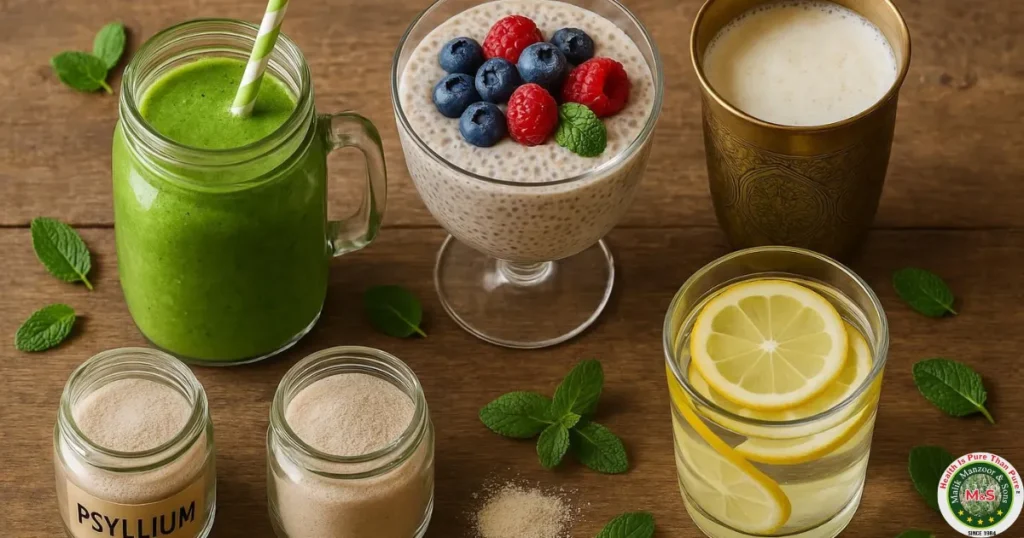
Safety, Side Effects & Precautions.
Common Initial Reactions (Usually Temporary).
Week 1-2:
- Mild bloating or gas.
- Increased bowel movements.
- Slight cramping.
- Fullness sensation.
These typically resolve as your body adjusts to increased fiber intake.
How to Minimize Discomfort.
Gradual Introduction Strategy:
- Week 1: 1/4 -1/ 2 tsp daily.
- Week 2: 1 tsp daily.
- Week 3: 1-2 tsp daily.
- Week 4+: Standard dosage.
Essential Hydration:
- Minimum 8-10 glasses of water daily.
- 2 glasses with each psyllium dose.
- Extra during exercise or heat.
- Monitor urine color (should be pale yellow).
Serious Contraindications.
Do NOT use psyllium if you have:
- Intestinal blockage or obstruction.
- Difficulty swallowing (dysphagia).
- Esophageal narrowing.
- Acute abdominal pain.
- Appendicitis symptoms.
- Recent GI surgery (within 6 weeks).
Medication Interactions.
Psyllium may affect the absorption of:
- Diabetes medications.
- Heart medications (digoxin).
- Carbamazepine (seizure medication).
- Lithium.
- Cholesterol medications.
- Warfarin (blood thinner).
Safety Rule: Take psyllium 2-4 hours before or after medications to prevent interaction.
Special Population Guidelines.
Pregnancy & Breastfeeding:
- Generally considered safe.
- Consult OB-GYN first.
- Start with lower doses.
- Monitor for comfort.
Children (6-12 years):
- Half adult dosage.
- Pediatrician approval required.
- Supervised administration.
- Ensure adequate water intake.
Elderly:
- Start very gradually.
- Monitor hydration carefully.
- Watch for swallowing difficulties.
- May need liquid fiber alternatives.
Athletes:
- Time doses away from workouts.
- Increase water intake proportionally.
- May affect nutrient timing.
- Don’t take immediately pre-competition.
When to See a Doctor.
Seek medical attention if you experience:
- Severe abdominal pain.
- Difficulty breathing.
- Chest pain after taking.
- Complete inability to pass stool after 3 days.
- Blood in stool.
- Severe allergic reaction (rare).
- Choking sensation.
Buying Guide: Choosing Quality Psyllium.
Quality Checklist.
✅ Purity Standards:
- 95%+ pure psyllium content.
- No added sugars or sweeteners.
- No artificial colors.
- No synthetic fillers.
- No preservatives.
✅ Certifications to Look For:
- Organic certification (if applicable).
- GMP (Good Manufacturing Practices).
- ISO quality standards.
- Third-party lab testing.
- Heavy metal testing reports.
✅ Packaging Quality:
- Airtight, moisture-proof container.
- Resealable option.
- UV-protected packaging.
- Clear expiration date.
- Batch number for traceability.
✅ Transparency Indicators:
- Source country clearly stated.
- Processing methods explained.
- Company contact information.
- Quality guarantees.
- Return/refund policies.
Price Expectations (2025 Market Rates).
Pakistan Domestic Market:
International Retail:
- 100g: $3-6 USD.
- 500g: $12-20 USD.
- 1kg: $18-35 USD.
Bulk/Wholesale (Pakistan):
- 50kg+: Contact for quote.
Where to Buy Authentic Psyllium.
Recommended Sources:
- Direct from established manufacturers.
- Reputable health food stores.
- Certified organic retailers.
- Pharmacies with supplement sections.
- Trusted e-commerce platforms.
Red Flags:
- Suspiciously low prices (40%+ below market).
- No contact information.
- Missing certifications.
- Unclear origin.
- Damaged or unsealed packaging.
- No expiration date.
Storage Best Practices.
Optimal Conditions:
- Cool, dry location (below 25°C/77°F).
- Away from direct sunlight.
- Airtight container always sealed.
- Low-humidity area.
- Separate from strong-smelling items.
Shelf Life:
- Unopened: 24-36 months.
- Opened: 18-24 months.
- Quality check: Color, smell, texture.
Signs of Degradation:
- Color darkening.
- Musty or off odors.
- Clumping or hardening.
- Presence of moisture.
- Loss of swelling capacity.
What is psyllium husk powder made from?
Psyllium husk powder is made from the outer covering of seeds from the Plantago ovata plant, a medicinal herb grown primarily in India and Pakistan. The seeds are harvested, the husks are mechanically separated, cleaned, and then finely ground into a smooth powder that contains high concentrations of soluble fiber.
How is organic psyllium husk powder different from regular?
Organic psyllium husk powder is cultivated without synthetic pesticides, chemical fertilizers, or GMOs, and must meet strict organic certification standards. While both organic and conventional psyllium offer similar fiber content and health benefits, organic ensures zero pesticide residue and supports sustainable farming practices, though it typically costs 20-30% more.
Is psyllium husk powder safe to take every day?
Yes, psyllium husk powder is safe for daily, long-term use when taken with adequate water. Unlike stimulant laxatives, psyllium doesn’t cause dependency and actually promotes natural digestive function. Most health organizations recommend 10-30g daily for adults as part of a healthy diet.
Can I use psyllium husk powder if I’m allergic to gluten?
Absolutely! Pure psyllium husk powder is completely gluten-free and safe for those with celiac disease or gluten sensitivity. In fact, it’s frequently used as a gluten substitute in gluten-free baking. Always check labels to ensure no cross-contamination occurred during processing if you’re highly sensitive.
What does “psyllium hydrophilic mucilloid powder” mean?
Psyllium hydrophilic mucilloid powder is the pharmaceutical term for psyllium husk powder, emphasizing its water-absorbing (hydrophilic) properties. The mucilage in psyllium absorbs water and forms a gel, which is responsible for its therapeutic effects. This terminology is commonly used in medical-grade products and prescriptions.
How do I say psyllium husk powder in Urdu?
In Urdu, psyllium husk powder is called “اسبغول پاؤڈر” (Isabgol Bhusi Powder). Isabgol (اسبغول) is the traditional name for psyllium used throughout Pakistan, India, and other Urdu-speaking regions, derived from Persian words meaning “horse’s ear” due to the seed shape.
Where can I buy authentic psyllium husk powder in Pakistan?
Psyllium husk powder in Pakistan is available at major pharmacies, health food stores, organic markets, and through reputable online platforms. For guaranteed quality, purchase directly from established manufacturers who provide lab certificates, proper packaging, and clear sourcing information. Look for products with certifications and transparent company details.
How quickly does psyllium husk powder work for constipation?
Most people experience relief within 12-72 hours of taking psyllium husk powder for constipation. Unlike harsh laxatives, psyllium works gradually by adding bulk and moisture to stool. For chronic constipation, full regulatory benefits typically appear after 3-7 days of consistent use with adequate water intake.
Can I mix psyllium powder with hot drinks like tea or coffee?
It’s not recommended to mix psyllium husk powder with hot beverages as heat causes the mucilage to gel instantly, creating an undrinkable thick mass. Always use room temperature or cold liquids, mix vigorously, and consume immediately. You can drink hot beverages 15-20 minutes after taking psyllium.
What’s the difference between whole psyllium husk and powder?
Whole psyllium husk consists of larger, intact pieces of seed coating with a coarser texture, while psyllium husk powder is finely ground for a smoother consistency. The powder dissolves faster, mixes more easily, and works better in recipes and baking, though both provide similar fiber content and health benefits. Powder is generally preferred for convenience.
Final Thoughts.
Understanding what is psyllium husk powder opens the door to one of nature’s most versatile and effective health supplements. From its botanical origins in Pakistan’s fertile farmlands to its powerful effects on digestive health, cholesterol management, and weight control, this simple fiber supplement has earned its place in modern wellness routines worldwide.
Whether you’re seeking organic psyllium husk powder for its chemical-free purity, exploring traditional remedies like psyllium husk powder in Urdu (isabgol), or simply looking for a natural way to improve your digestive health, the science and centuries of traditional use speak clearly: psyllium works.
The key to success lies in starting slowly, maintaining consistency, staying well-hydrated, and choosing quality products from trusted sources. As someone who has dedicated decades to perfecting psyllium cultivation and processing, I can confidently say that this remarkable powder, when used correctly, has the potential to transform your health naturally and gently.
Ready to experience the benefits of premium-quality psyllium husk powder? Explore our complete range of products, sourced directly from Pakistan’s finest farms and processed with uncompromising quality standards. Your journey to better digestive health starts with a single teaspoon.
Malik Shabbir
Featured Blogs
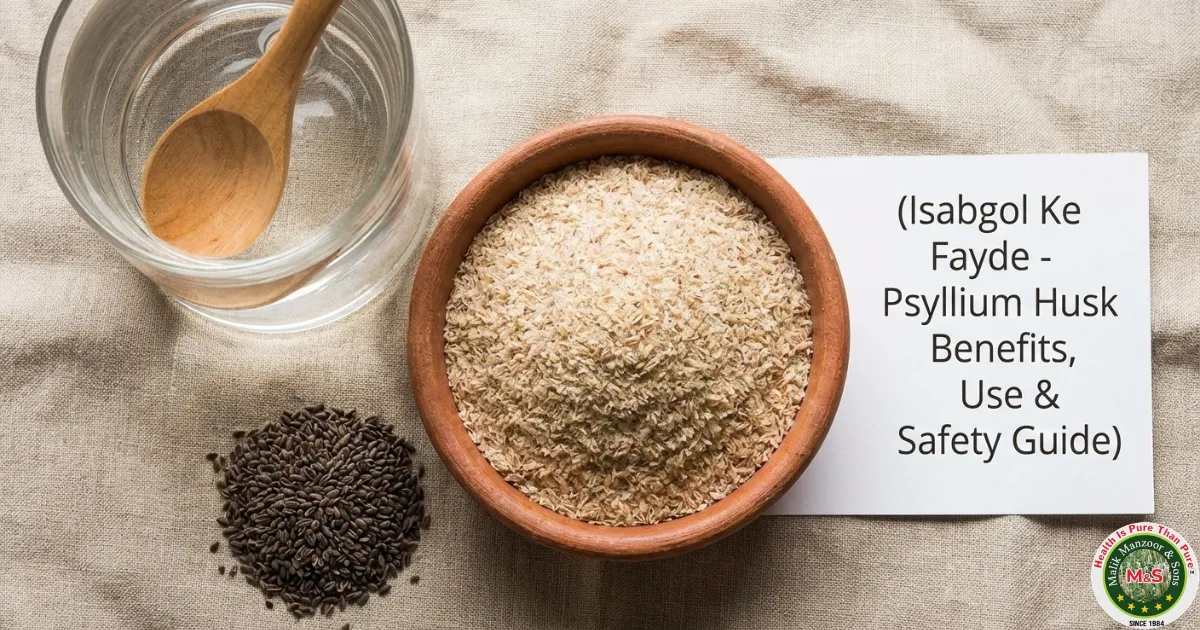
Isabgol Ke Fayde – Psyllium Husk Ke Poori Science-Based Rahnumayi – 2026
Isabgol ke fayde jaanna aaj ke daur mein zyada zaroori
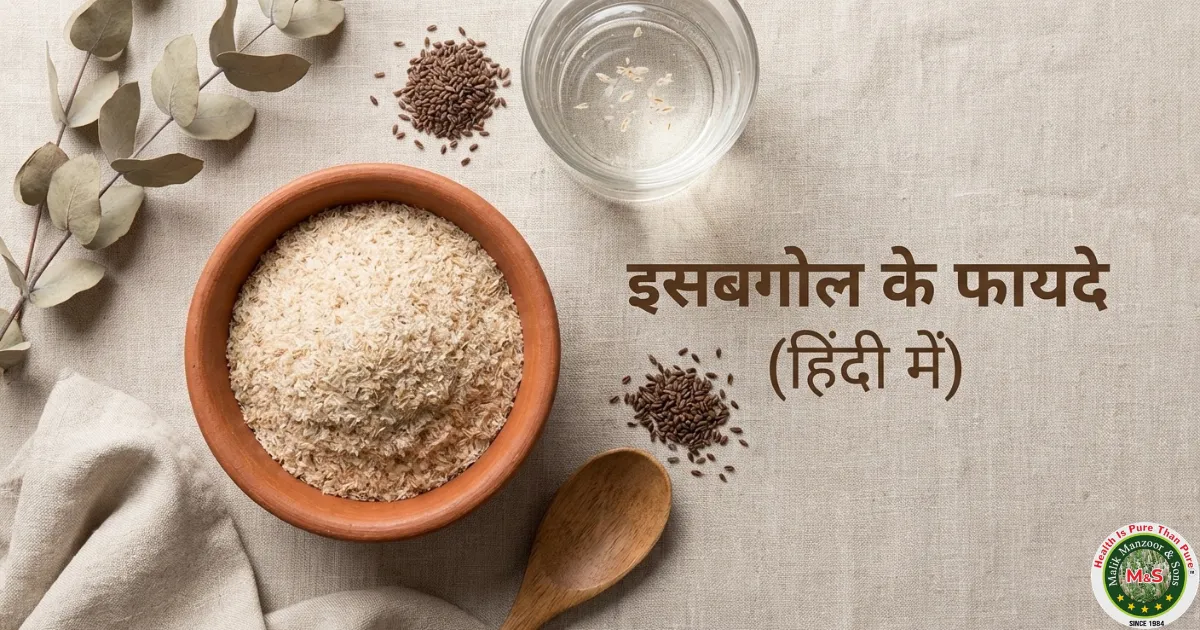
Isabgol Benefits in Hindi | Psyllium Husk Ke Fayde, Sahi Upyog Aur Savdhaniyan – 2026
Agar aap isabgol benefits in hindi mein samajhna chahte hain,
